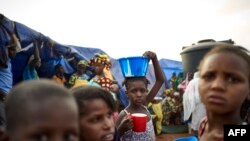The U.N. organization for the coordination of humanitarian affairs, OCHA, reports a surge in conflict in central Mali is worsening humanitarian conditions for millions of people.
U.N. officials report the number of people needing humanitarian assistance since the beginning of the year has surged by 22 percent to nearly 4 million. It says one in five people in Mali is dependent upon international aid for survival.
During the same period, OCHA spokesman Jens Laerke says the number of people forced to flee from inter-communal violence has doubled to more than 168,500. He says increased displacement is causing severe food shortages.
“When people are simply removed from where they grow their food or where they have their livestock, they do not have access to that, and they do not get the level of food that they need. But of course when the needs increase and we do not see a marked significant increase of the security in which we can deliver aid, that is a huge problem,” Laerke said.
Another huge problem is lack of money. Laerke says the U.N. has revised its appeal upwards by 10 percent. Unfortunately, he says only 30 percent of the $324 million requested has been received.
Consequently, he told VOA OCHA has been forced to cut back on a number of important programs in order to pay for the most basic life-saving needs, such as food and potable water.
“I can tell you that there are certain sectors that are critically underfunded. For example, health has received 2.8 percent of the financing that they were asking for. That means that a lot of health projects which had been designed and were ready to begin simply cannot take off. They do not start,” he said.
Laerke said other critically underfunded programs include education, protection, water and sanitation. He noted the loss of these programs has serious consequences for the present and future well-being of the population.








